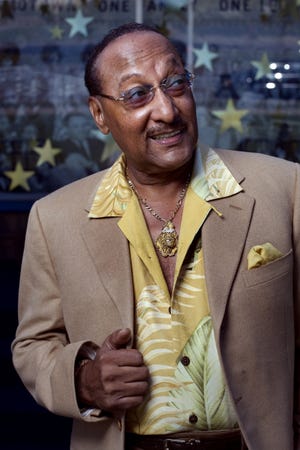Motown Legend Duke Fakir Passes Away at 88

Abdul "Duke" Fakir, the stylish and sophisticated vocalist who nurtured the Four Tops' legacy for seven decades, has passed away at the age of 88.
Fakir died peacefully at his home in Detroit on Monday morning from heart failure, his family confirmed to the Detroit Free Press. He was the last surviving member of the beloved Motown group, following the deaths of his longtime friends and bandmates Lawrence Payton, Obie Benson, and Levi Stubbs.
"Our hearts are heavy as we mourn the loss of a trailblazer, icon, and music legend who, through his 70-year music career, touched the lives of so many," the Fakir family stated. "As the last living founding member of the iconic Four Tops music group, we find solace in Dukeâs legacy living on through his music for generations to come."
Fakir's "operatic" voice, as fellow Motown artist Martha Reeves described it, was a defining element of the Four Tops' sound. The group produced a string of hits throughout the decades, including some of the defining songs of the 1960s: "I Canât Help Myself (Sugar Pie Honey Bunch)," "Itâs the Same Old Song," "Bernadette," "Standing in the Shadows of Love," and their 1966 masterpiece, "Reach Out Iâll Be There." The Four Tops continued to chart success into the '80s with hits like the R&B chart-topper "When She Was My Girl."
Even after the passing of his bandmates, Fakir kept the Four Tops name alive, enlisting new members and continuing to perform their polished and energetic stage show worldwide. He remained a beloved figure in the music industry, known for his gracious personality and down-to-earth demeanor.
Smokey Robinson, a longtime friend and fellow Motown alumnus, expressed his grief in a statement: "My brother, I really hate to have to say goodbye, but you've been called home by the Father to once again join Lawrence, Obie and Levi and make more of the heavenly music you guys made while here. I'm going to miss you, my brother."
Fakir's love for music began in his youth, growing up in a religious family and developing a talent for singing as a tenor. He was also a talented athlete, playing football and basketball at Pershing High School.
Recalling a pivotal moment in his childhood, Fakir shared a story of an encounter with a "lady in white" at the age of 8, who prophesied his musical future: âShe stopped and turned: âSon, you sing, donât you?â I said, âI try to, maâam.â She said, âWhooo, son, look at all those angels around you. I can see the world is going to love your music. Youâll be singing with four guys. Youâll be so popular, so good and so blessed.'"
The prophecy proved true. Fakir formed the Four Tops in 1953, emerging from Detroit's vibrant doo-wop scene. The group initially performed under the name "The Four Aims," but later adopted the name "Four Tops," establishing a presence in Detroit nightclubs.
Despite early successes, the group struggled to find wider success after signing with various labels, including Chess and Columbia. It was during this period that Fakir and the group initially resisted overtures from Motown Records chief Berry Gordy, skeptical of a Black-owned label's potential for success in the white-dominated music industry.
But the Four Tops' perspectives changed when they witnessed the first Motortown Revue play the Apollo Theater in New York. They realized the power of Motown and signed with the label in 1963, launching their career into a whirlwind of success.
Within a year, the group landed their first hit, "Baby I Need Your Loving," a collaboration with the songwriting-production team Holland-Dozier-Holland. The following years were marked by a frantic pace of recording, touring, and television appearances. The Four Tops rubbed shoulders with the likes of the Beatles and were prime-time stars on "The Ed Sullivan Show," where Fakir's distinctive presence on screen made him a recognizable figure.
In 1972, the Four Tops left Motown for the ABC/Dunhill label, enjoying continued success with hits like "Keeper of the Castle," "Ainât No Woman (Like the One Iâve Got)," and "Catfish."
The group returned to Motown in the 1980s, experiencing a renewed surge of popularity fueled by baby-boomer nostalgia and films like "The Big Chill." Their performance on the 1983 "Motown 25" TV special alongside the Temptations further cemented their legacy.
Fakir was also dedicated to preserving the Four Tops' story through a stage musical that was still in development at the time of his passing. He was adamant that the show would premiere in Detroit, the city where it all began.
"Everything Iâve done â my music, my life, my family â comes from Detroit," Fakir said. "Detroit deserves it. Theyâve given me so much. I would feel like a fool premiering it anywhere other than home. This is where it belongs.â
The Four Tops and Temptations were often portrayed as rivals, but in reality, the groups were close friends. Otis Williams, a member of the Temptations, praised Fakir's enduring spirit and style: "I call him Mr. Detroit. The brother can dress. I'm a fashion maven, and I've always admired how he put clothes together. That's Detroit.â
Turkessa Ferrer-Babich, daughter of the late Supremes singer Mary Wilson, shared her condolences: "Thank you, Duke, for being a true friend to my mother and constant gentleman with the biggest heart. May you rest in peace."
Matt Lee, a Detroit publicist who worked closely with Fakir for many years, described him as a "finest gentleman," known for his kindness and generosity.
The Four Tops gradually eased out of recording after the death of Payton in 1997, but they remained active performers, with Fakir continuing to tour with the group until the end of 2023. He officially retired from performing this year.
Reflecting on his life and career, Fakir found a sense of wonder in the journey: âThereâs a driving force that indicates why all that happened and how it happened. And itâs colorful. And itâs all about love â something we all need to see again these days,â Fakir said. âItâs love of music, love of people working together, love of looking out into the audiences, seeing those smiling faces.â
Fakir is survived by his wife, Piper Fakir; daughter Farah Fakir Cook; son Nazim Bashir Fakir; son Abdul Kareem Fakir Jr.; son Myke Fakir; son Anthony Fakir; son Malik Robinson; 13 grandchildren; and nine great-grandchildren.





